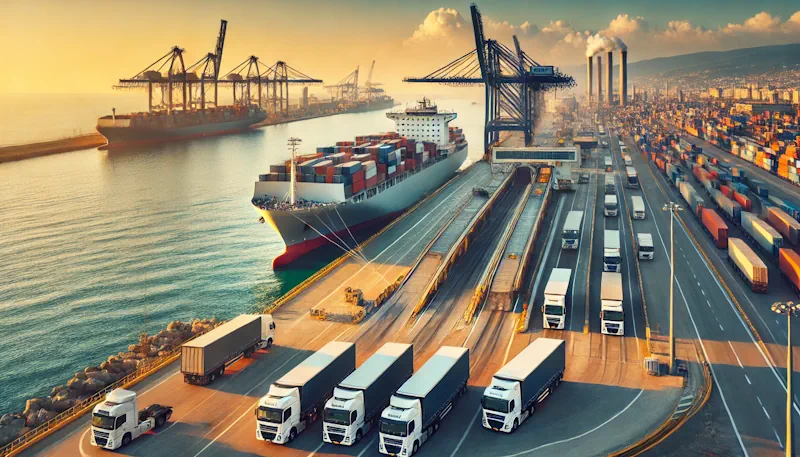
What is Supply Chain Logistics? Definition, Importance, and How It Works
Supply chain logistics is a key element in the broader framework of supply chain management, but the two terms are often used interchangeably, leading to confusion. While both play integral roles in moving goods and materials from point A to point B, they represent distinct functions. Supply chain logistics is specifically about the coordination of sourcing, storing, and delivering goods to the end consumer, whereas logistics, on its own, focuses on the transportation and warehousing of goods within the supply chain.
So, what is supply chain logistics in its essence? It involves managing the flow of resources, materials, and information, ensuring that the movement, storage, and distribution of goods occur efficiently throughout the supply chain. From planning and procurement to manufacturing and delivery, supply chain logistics provides a seamless integration of processes, aimed at reducing costs, improving productivity, and enhancing customer satisfaction.
The Role of Supply Chain Logistics Explained
The supply chain begins the moment a customer places an order and ends when the product is successfully delivered to their doorstep. This process involves a range of activities, from supplier management to order fulfillment, all of which must be optimized to ensure a smooth operation. But what exactly is the role of supply chain logistics, and how does it work?
In a supply chain, logistics is responsible for organizing transportation, managing inventory, and controlling storage facilities. These processes ensure that products are readily available to meet customer demands, no matter where they are located. Whether it involves coordinating inbound logistics for raw materials or handling outbound logistics for finished products, effective supply chain logistics can significantly boost a company’s performance.
What is the Importance of Supply Chain Logistics?
The significance of supply chain logistics lies in its ability to enhance supply chain efficiency and reduce overall costs. By optimizing logistics processes such as transportation, warehousing, and distribution, companies can achieve substantial cost savings, reduce waste, and streamline operations. Efficient supply chain logistics also helps businesses expand their reach into new markets by delivering products to consumers faster and more reliably.
Supply chain logistics also plays a critical role in managing relationships between suppliers, manufacturers, distributors, and retailers. This function ensures that every party involved in the supply chain works in harmony to fulfill orders accurately and on time. Ultimately, the effectiveness of supply chain logistics directly impacts a company’s ability to meet consumer expectations, providing a strong foundation for long-term success.
Key Components of Supply Chain Logistics
Supply chain logistics encompasses a variety of components, each of which plays a crucial role in ensuring a seamless flow of goods and materials. Below, we’ll explore some of the primary functions involved in supply chain logistics:
1. Warehousing and Inventory Management
A major aspect of supply chain logistics is determining how goods are stored and managing inventory levels effectively. Warehousing involves optimizing the design and layout of storage facilities, which can be located near suppliers, manufacturers, or consumers, depending on the company’s strategy. Efficient inventory management helps businesses keep track of stock levels, avoid shortages, and minimize storage costs.
2. End-to-End Process Control
Supply chain logistics is responsible for managing the entire process, from packaging and labeling to transportation and final delivery. This includes coordinating the loading and unloading of vehicles, ensuring that products are delivered intact, and maintaining transparency throughout the supply chain. By having end-to-end visibility, companies can monitor the movement of goods in real time, address any issues that may arise, and ensure timely delivery to customers.
3. Transportation Management
The movement of goods is a fundamental part of supply chain logistics. Transportation management involves selecting the most efficient routes, choosing the best mode of transportation (e.g., road, rail, air, or sea), and optimizing the use of resources. By planning transportation carefully, businesses can reduce fuel costs, minimize delivery times, and achieve overall efficiency in their logistics operations.
4. Handling Customs and Documentation
For international shipments, supply chain logistics includes managing all documentation related to customs, duties, and regulations. This process ensures that goods comply with local laws and that any delays are minimized. Efficient handling of customs procedures is essential for timely deliveries, and logistics teams must be well-versed in the requirements of different countries to facilitate smooth international trade.
Benefits of Efficient Supply Chain Logistics
A well-managed supply chain logistics function offers several benefits that can help an organization thrive in a competitive market:
- Cost Reduction: By optimizing logistics through automation and technology, companies can significantly cut costs associated with material handling, inventory management, and transportation. Reducing operational costs allows businesses to achieve higher profit margins and improve pricing for consumers.
- Enhanced Customer Satisfaction: Efficient logistics providers ensure on-time deliveries, minimize product damage, and offer services such as quick returns and excellent customer support. These practices lead to increased customer satisfaction, which is crucial for building brand loyalty and gaining a competitive edge.
- Reduced Risks and Losses: Supply chain logistics also plays a vital role in managing risks associated with product returns, damaged goods, and transit delays. By using sophisticated tracking systems and preventive measures, companies can mitigate losses and protect their profitability.
- Sustainability and Waste Reduction: A well-optimized supply chain logistics system helps reduce waste by eliminating unnecessary steps in the production and delivery process. This not only lowers operational costs but also promotes sustainable business practices, which is increasingly important for both consumers and stakeholders.
Types of Logistics Service Providers in Supply Chain Management
To effectively manage supply chain logistics, businesses may work with various types of logistics service providers. These providers help facilitate the movement and storage of goods, each offering different services:
- In-House Logistics Providers: Some companies maintain their own in-house logistics teams to manage deliveries and handle all aspects of transportation, warehousing, and inventory control.
- Third-Party Logistics (3PL): 3PL providers are external logistics partners that handle various aspects of the supply chain, such as transportation, warehousing, and even cold storage for temperature-sensitive goods.
- Reverse Logistics Providers: Reverse logistics deals with the return of products from customers back to the warehouse for repair, recycling, or disposal. Specialized reverse logistics providers ensure that returned goods are efficiently handled.
- Warehousing Providers: In addition to storing goods, these providers may offer value-added services such as packaging, labeling, and transportation to the end customer.
- Courier Services: Courier companies focus solely on the final delivery of products to customers’ doorsteps, offering efficient and reliable last-mile delivery services.
Why is Supply Chain Logistics Important for Business Success?
Supply chain logistics is an integral part of any business that deals with physical products. By ensuring that goods are moved and stored efficiently, supply chain logistics directly contributes to the profitability and competitiveness of an organization. The ability to deliver products to customers on time, reduce costs, and manage inventory effectively gives companies a significant advantage in the marketplace.
Supply chain logistics also helps businesses respond quickly to changing market conditions, whether it be fluctuating customer demand, supply chain disruptions, or shifts in consumer preferences. By implementing advanced technologies, such as real-time tracking systems and data analytics, companies can gain deeper insights into their logistics operations, optimize processes, and adapt to challenges as they arise.
Conclusion
In conclusion, supply chain logistics is more than just the movement of goods; it is a comprehensive function that involves the coordination of transportation, warehousing, inventory management, and customer service to ensure a smooth and efficient supply chain. By optimizing logistics processes, companies can reduce costs, improve customer satisfaction, and achieve long-term success in the marketplace.
Supply chain logistics is essential for any business looking to stay competitive in today’s fast-paced global economy. It provides the foundation for effective supply chain management, empowering organizations to make data-driven decisions, enhance productivity, and deliver value to their customers.
S.S.S. (Frequently Asked Questions)
- What is supply chain logistics and how does it differ from supply chain management?
Supply chain logistics focuses on the movement, storage, and delivery of goods, while supply chain management covers the entire process, including procurement, production, and distribution. - Why is supply chain logistics important in business?
Supply chain logistics ensures that goods are moved efficiently, reducing costs, improving delivery times, and enhancing overall customer satisfaction—crucial for business success. - What are the key components of supply chain logistics?
The key components include warehousing, transportation, inventory management, and handling customs and documentation. Each part plays a crucial role in maintaining an efficient supply chain. - How do third-party logistics (3PL) providers help in supply chain management?
3PL providers offer services such as transportation, warehousing, and cold storage, enabling companies to outsource logistics functions and focus on core business activities.






